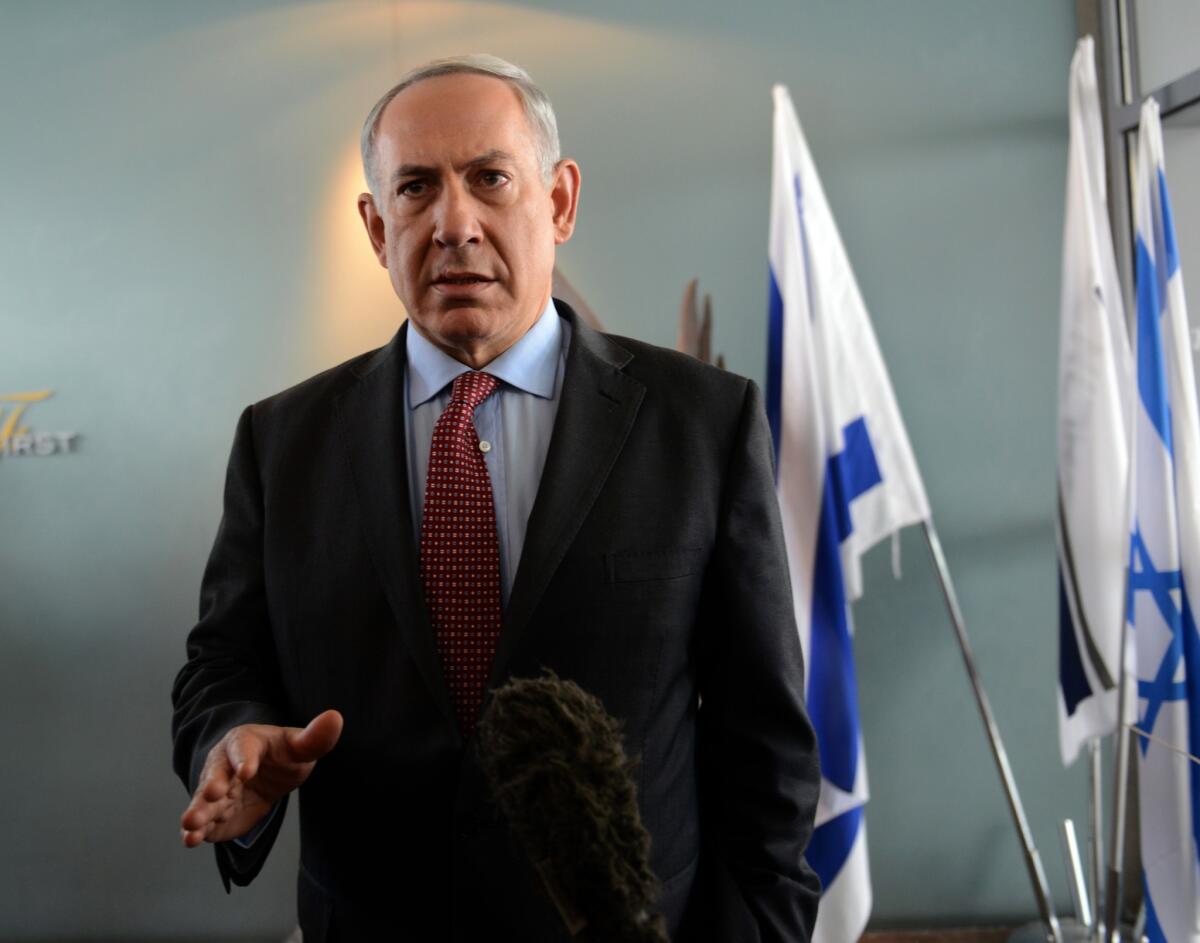New signs of tension between U.S. and Israel over Iran talks

- Share via
WASHINGTON -- The Obama administration’s dispute with Israel over Iran intensified Wednesday, even as Secretary of State John F. Kerry prepared to visit Capitol Hill to ask lawmakers to hold off on new sanctions that could disrupt pending international negotiations over the Iranian nuclear program.
One day after the White House warned Congress that new sanctions could begin a “march to war,” Israeli Prime Minister Benjamin Netanyahu pushed back, declaring that the choice was not between sanctions and military action.
“There are not just two possibilities on the Iranian issue, a bad deal or war,” Netanyahu told Israel’s Knesset, or parliament. “There is a third possibility -- and that is continuing the pressure of sanctions.”
“I would even say that a bad deal is liable to lead to the second, undesired result,” he said.
With international negotiations apparently close to an interim deal to curb Iran’s nuclear program, U.S. officials have been warning that more economic penalties imposed on Iran could drive it from the bargaining table or unravel the international coalition that has cut trade with Tehran to force it to restrict its nuclear program.
Many countries suspect Iran is seeking the ability to make nuclear weapons, though Iranian officials denies it.
Netanyahu, like many members of Congress, fears the White House may accept too lenient a deal, and he is urging stronger sanctions in hopes of making Tehran more willing to yield. He has strongly criticized the U.S.-led negotiating position, calling the proposed deal a “grievous, historic error.”
His tough tactics have set off a debate in Israel and among American pro-Israel organizations about whether it is wise for the prime minister to split sharply with the White House. Some observers say he should not risk being seen as trying to push the United States to war.
Netanyahu argued that the six world powers negotiating with Iran need not rush to accept a bad deal, but should take their time building up pressure that could further weaken the Iranian economy.
“There is no reason to submit to Iranian diktat, nor is there any reason to be hasty,” he said. “Iran is under very harsh economic pressure and the advantage is with those applying the pressure.”
On Tuesday, White House spokesman Jay Carney said the alternative to diplomacy was military action, and that Americans “do not want a march to war.”
Kerry and other top U.S. officials will face a tough audience in their meetings later Wednesday with the Senate Banking Committee, which is considering new sanctions legislation, and with the Senate Democratic leadership.
A number of key lawmakers, including Senate Foreign Relations Committee Chairman Sen. Bob Menendez (D-N.J.) and ranking minority member Bob Corker (R-Tenn.) have signaled that they want to press ahead to build further pressure. Corker has said he wants to limit some of President Obama’s authority to waive sanctions, which the president has used to avoid antagonizing U.S. allies and other world powers over U.S. sanctions on Iran.
It would probably take months for new sanctions to begin to take effect. But administration officials are warning that if Congress moves to add penalties while negotiations continue, Iran could see that as a sign of bad faith and pull back.
Meanwhile, Obama spoke Wednesday to French Prime Minister Francois Hollande by telephone about the nuclear negotiations, U.S. and French officials said. France has taken a consistently tough position on the Iran nuclear issue. French Foreign Minister Laurent Fabius went public Friday to demand that the six world powers negotiating with Iran --the U.S., France, Britain, Germany, China and Russia -- toughen the terms of their proposed deal.
In Vienna, the head of the United Nations nuclear watchdog agency told Reuters news agency that he had seen no sign that the new Iranian government under President Hassan Rouhani had accelerated the nuclear program since it took office in August.
Yukiya Amano, director general of the International Atomic Energy Agency, said he had seen no “radical change,” suggesting that Tehran had not stepped up production of enriched uranium, a potential nuclear bomb fuel.
He also said that Iran still had “quite a lot to do” to complete a heavy water reactor, that has raised international concerns.
ALSO:
Palestinian accused of stabbing Israeli soldier to death
Six of 14 new states on Human Rights Council called abusers
U.N. denounces mortar attacks on schools in the Syrian capital
Twitter: @richtpau
More to Read
Sign up for Essential California
The most important California stories and recommendations in your inbox every morning.
You may occasionally receive promotional content from the Los Angeles Times.











